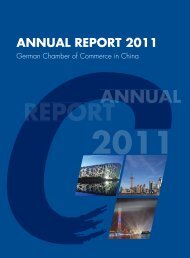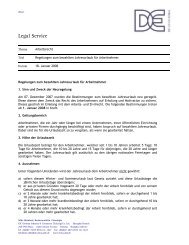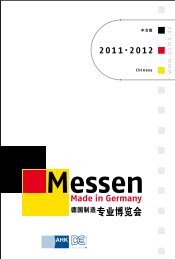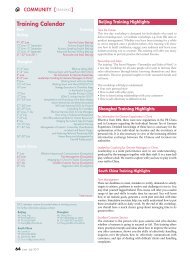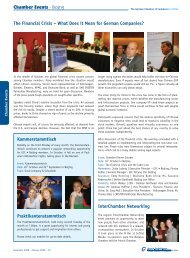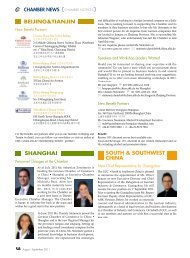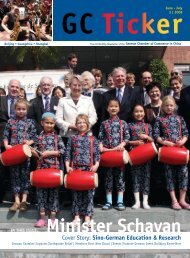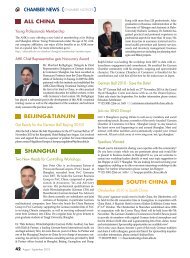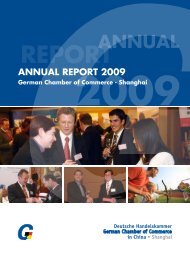Oktoberfest China - AHKs
Oktoberfest China - AHKs
Oktoberfest China - AHKs
Create successful ePaper yourself
Turn your PDF publications into a flip-book with our unique Google optimized e-Paper software.
Beijing • Guangzhou • Shanghai<br />
IN THIS ISSUE:<br />
October - November<br />
2008<br />
<strong>Oktoberfest</strong> <strong>China</strong><br />
Cover Story: Record Number of Visitors at <strong>Oktoberfest</strong><br />
Beijing Financial Street | Profile of German Expats in Shanghai | WWII German Passports Found at Shanghai Fleamarket
With an optimized, strategic business alignment and<br />
a persuasive, creative appearance, we will give your brand<br />
a competitive edge that will ensure lasting profit growth.<br />
With expertise and a personal touch, Montfort Werbung<br />
will support you in all areas of successful brand leadership –<br />
in the US, Europe and Asia.<br />
MONTFORT SHANGHAI<br />
Yeeeeeeeeeeeeha!<br />
SHANGHAI (CN) · KLAUS (A) · RUGGELL (FL) · CHICAGO (USA)<br />
Room 1101, 555 Nanjing West Road, 200041 Shanghai<br />
Contact person: Oliver Lorenz, B2B@montfortshanghai.com<br />
Tel. +86 (0) 21 / 52 13 66 00 - 800
GCC Board<br />
Beijing<br />
* All-<strong>China</strong> Board member<br />
October - November 2008 | 2<br />
Siemens Ltd. <strong>China</strong><br />
President and CEO<br />
Dr. Richard Hausmann *<br />
Chairman<br />
KPMG Huazhen Certified Public<br />
Accountants<br />
Partner Audit<br />
Mr. Andreas Feege<br />
Treasurer<br />
German Chamber Beijing<br />
Executive Director<br />
Ms. Jutta Ludwig *<br />
Delegate & Chief Representative<br />
Delegation of German Industry<br />
& Commerce Beijing<br />
Deutsche Bank (<strong>China</strong>) Co. Ltd.<br />
Beijing Branch<br />
Director, Head of Corporate Banking<br />
Coverage, <strong>China</strong><br />
Mr. Eddy Henning<br />
Gruner+Jahr (Beijing)<br />
Advertising Co. Ltd.<br />
General Manager & President<br />
Mr. Wolfgang Kohl<br />
Volkswagen (<strong>China</strong>)<br />
Investment Co. Ltd.<br />
Executive Vice President,<br />
Finance Department<br />
Dr. Jörg Mull<br />
TUI <strong>China</strong> Travel Co. Ltd.<br />
CEO<br />
Mr. Marcel Schneider<br />
Bayer (<strong>China</strong>) Ltd.<br />
Vice President, Corporate Social<br />
Responsibility Greater <strong>China</strong><br />
Mr. William Valentino<br />
Daimler AG<br />
Executive Vice President<br />
Daimler Northeast Asia Ltd.<br />
Chairman & CEO<br />
Mr. Ulrich Walker<br />
Shanghai Guangzhou<br />
Lufthansa German Airlines<br />
Managing Director Greater <strong>China</strong><br />
Mr. Arved von zur Mühlen *<br />
Chairman<br />
Bosch (<strong>China</strong>) Investment Ltd.<br />
Executive Vice President<br />
Mr. Elmar E. Weitzel<br />
Vice Chairman<br />
Vossloh Fastening Systems<br />
(<strong>China</strong>) Co. Ltd.<br />
CEO<br />
Mr. Thomas Dorn<br />
Treasurer<br />
German Chamber Shanghai<br />
Executive Director<br />
Mr. Manfred Rothgänger *<br />
Delegate & Chief Representative<br />
Delegation of German Industry<br />
& Commerce Shanghai<br />
Beiten Burkhardt Rechtsanwaltgesellschaft<br />
mbH<br />
Shanghai Representative<br />
Office<br />
Chief Representative<br />
Mr. Rainer Burkardt<br />
Siemens Shanghai Medical<br />
Equipment Ltd.<br />
President and CEO<br />
Dr. Rolf Hupke<br />
POLYMAX (Shanghai) Trading<br />
Co. Ltd.<br />
Chairman of the Board<br />
Mr. Ulrich Mäder<br />
Allianz <strong>China</strong> Life Insurance<br />
Co. Ltd.<br />
CEO<br />
Mr. Christian Molt<br />
Management Engineers<br />
<strong>China</strong> Ltd.<br />
Managing Director<br />
Ms. Brigitte Wolff<br />
The German Chamber of Commerce in <strong>China</strong><br />
Trolli Confectionery Co. Ltd.<br />
Guangzhou<br />
General Manager<br />
Mr. Michael Stein *<br />
Chairman<br />
German Chamber Guangzhou<br />
Executive Director<br />
Ms. Alexandra Voss *<br />
Delegate & Chief Representative<br />
Delegation of German Industry &<br />
Commerce Guangzhou<br />
Lufthansa German Airlines<br />
Guangzhou<br />
General Manager, Southern <strong>China</strong><br />
Mr. Nico Beilharz<br />
TCA Ltd. The Cable Assembler<br />
Dongguan<br />
CEO / President<br />
Mr. Frank Jaeger<br />
VA TECH ELIN Transformer<br />
Guangzhou Co. Ltd. (Siemens<br />
Group)<br />
General Manager<br />
Mr. Dirk Soete<br />
C. Melchers GmbH & Co. KG<br />
Guangzhou & Chongqing<br />
Representative Offices<br />
Inspirion GmbH Guangzhou<br />
Representative Office<br />
Chief Representative<br />
Ms. Renate Tietjen
The German Chamber of Commerce in <strong>China</strong><br />
www.china.ahk.de 3 | October - November 2008
Preface<br />
The GC Ticker is the internal bi-monthly newsletter<br />
of the German Chamber of Commerce in <strong>China</strong>.<br />
Publisher<br />
German Chamber of Commerce in <strong>China</strong><br />
Managing Editor<br />
Ms. Kristen Robinson (Shanghai)<br />
Editorial Team<br />
Mr. Walter Jansen (Beijing)<br />
Mr. Kilian Becker (Guangzhou)<br />
GC Ticker is free of charge. For subscription or<br />
extra copies please email your nearest Chamber<br />
office<br />
Other issues of the magazine can be found on<br />
our website: www.china.ahk.de/publications<br />
For editorial or sponsorship inquiries please<br />
contact:<br />
German Chamber of Commerce in <strong>China</strong><br />
Beijing Office<br />
German Chamber of Commerce<br />
in <strong>China</strong> • Beijing<br />
0811 Landmark Tower 2, 8 Dongsanhuan (N) Rd.<br />
Chaoyang, Beijing 100004<br />
Tel: +86-10-6590 0926 ext. 308<br />
Fax: +86-10-6590 6313<br />
Email: jansen.walter@bj.china.ahk.de<br />
Guangzhou Office<br />
German Chamber of Commerce<br />
in <strong>China</strong> • Guangzhou<br />
2915 Metro Plaza, Tianhe (N) Rd.<br />
Guangzhou 510620<br />
Tel: +86-20-8755 2353<br />
DL: +86-20-8755 8203<br />
Fax: +86-20-8755 1889<br />
Email: becker.kilian@gz.china.ahk.de<br />
Shanghai Office<br />
German Chamber of Commerce<br />
in <strong>China</strong> • Shanghai<br />
29F, POS Plaza, 1600 Century Ave.<br />
Pudong, Shanghai 200122<br />
Tel: +86-21-5081 2266, ext. 1637<br />
Fax: +86-21-5081 2009<br />
Email: robinson.kristen@sh.china.ahk.de<br />
© 2007-2008. German Chamber of Commerce in <strong>China</strong>.<br />
No part of this publication may be reproduced without<br />
the publisher’s prior permission. While every effort has<br />
been made to ensure accuracy, the publisher is not responsible<br />
for any errors. Views expressed are not necessarily<br />
those of GIC/GCC.<br />
October - November 2008 | 4<br />
Dear Member,<br />
As host of the 2008 Olympic Games, <strong>China</strong><br />
has been under close watch from the<br />
whole world throughout the year. Expectations<br />
ran high due to the tremendous<br />
changes implemented over the past 30<br />
years during <strong>China</strong>’s reform policy. Chinese<br />
leaders, as well as the organizers of the<br />
Games, were well aware that the Beijing<br />
Olympics would affect the way the world<br />
looks at <strong>China</strong>, and they successfully presented<br />
an open, modern country at arm’s<br />
length from industrialized nations.<br />
Undoubtedly great efforts were made to<br />
display the best of the country, foremost<br />
in the nation’s capital. In South <strong>China</strong><br />
people watched the games right from the<br />
start with enthusiasm, and beamed with<br />
pride when Guangzhou native Chen Xiexia<br />
won the first gold medal for the Chinese<br />
team. At 152cm in height, the 25-yearold<br />
weightlifter set an Olympic record by<br />
lifting a total of 212kg. It was the first of<br />
13 medals won by athletes from Guangdong<br />
province. One of the stars of the<br />
Games, Zou Kai, hails from Sichuan province.<br />
In fact, the 20-year-old gymnast<br />
from Luzhou is the second Chinese to<br />
receive three gold medals at a single<br />
Olympic Games. Winning the team gold<br />
and individual gold medals in the floor<br />
exercise and the horizontal bar, he has<br />
given the people in Sichuan a reason to<br />
celebrate.<br />
The earthquake in Zou Kai’s home province<br />
overshadowed the run up to the date<br />
of the opening ceremony on 8 th August.<br />
The vast support and help offered by<br />
numerous countries after the tragic earthquake<br />
clearly underscored that <strong>China</strong> can<br />
The German Chamber of Commerce in <strong>China</strong><br />
South <strong>China</strong> Congratulates Local Medalists,<br />
Gears up for Germany and <strong>China</strong> Event Series<br />
rely on its partners and that whatever<br />
happens here is of relevance to the rest<br />
of the world. The member companies of<br />
the German Chambers of Commerce in<br />
<strong>China</strong> raised a significant sum to alleviate<br />
the situation and transferred supplies<br />
and equipment to those in need. A charity<br />
concert during the Chongqing station<br />
of the event series “Germany and <strong>China</strong><br />
– Moving ahead together” was appreciated<br />
and enjoyed enthusiastically by the<br />
Chinese audience.<br />
We are looking forward to making the<br />
upcoming station of “Germany and <strong>China</strong><br />
– Moving ahead together” in Guangzhou<br />
with its German Esplanade from 7 th -15 th<br />
November a big success. The event will<br />
definitely signal Germany’s consolidated<br />
interest in partnering with <strong>China</strong> and<br />
further strengthen the mutually beneficial<br />
exchange between our two countries. The<br />
German Chamber of Commerce • Guangzhou<br />
will, together with its local partners,<br />
take a leading role in the organization of<br />
economic events during this time. Among<br />
other activities, we will organize a conference<br />
on small and medium enterprises<br />
that will focus on business promotion<br />
issues and bilateral development opportunities.<br />
Another example of the activities<br />
planned is a forum on vocational training<br />
which will serve as a platform for the presentation<br />
of Germany’s duale system and<br />
the identification of cooperation opportunities<br />
in South <strong>China</strong>.<br />
We hope members and friends of the<br />
German Chamber of Commerce will use<br />
the opportunity of this major event series<br />
to visit Guangzhou and look forward to<br />
meeting you at one of the various business<br />
and cultural activities!<br />
Mr. Michael Stein<br />
Chairman of the German Chamber of Commerce in <strong>China</strong>, Guangzhou<br />
General Manager of Trolli Confectionery Co. Ltd. Guangzhou
Chamber Teams<br />
Join Our Growing<br />
Network<br />
Now at Half Price<br />
Take advantage of our<br />
comprehensive, <strong>China</strong>wide<br />
network of German compa-<br />
nies. Six month memberships<br />
lasting through December<br />
2008 available at half price.<br />
Contact your local Chamber<br />
for details.<br />
Beijing<br />
Ms. Katja Sassi-Bucsit<br />
010 6590-6930<br />
Email: sassi-bucsit.katja@bj.china.ahk.de<br />
Guangzhou<br />
Mr. Kilian Becker<br />
020 9755-8203<br />
becker.kilian@gz.china.ahk.de<br />
Shanghai<br />
Ms. Heidrun Buss<br />
021 5081-2266 ext. 1656<br />
buss.heidrun@sh.china.ahk.de<br />
June October - July - November 2008 | 62008<br />
| 6<br />
Beijing<br />
Guangzhou<br />
Shanghai<br />
Ms. Katja Sassi-Bucsit<br />
Executive Chamber Manager<br />
Tel: 010 6590-6930<br />
Email: sassi-bucsit.katja@bj.china.ahk.de<br />
Ms. Claudia Barkowsky<br />
Regional Manager North <strong>China</strong><br />
Tel: 010 6590-0926 ext. 329<br />
Email: barkowsky.claudia@bj.china.ahk.de<br />
Mr. Kilian Becker<br />
Manager Membership & Events<br />
Tel: 020 8755-8203<br />
Fax: 020 8755-1889<br />
Email: becker.kilian@gz.china.ahk.de<br />
Ms. Anna-Lisa Hartmann<br />
Senior Manager Chamber Affairs<br />
Tel: 021 5081-2266 ext. 1630<br />
Fax: 021 5081-2266 ext. 5630<br />
Email: hartmann.anna-lisa@sh.china.ahk.de<br />
Ms. Heidrun Buss<br />
Project & Event Manager Shanghai<br />
Tel: 021 5081-2266 ext. 1656<br />
Fax: 021 5081-2266 ext. 5656<br />
Email: buss.heidrun@sh.china.ahk.de<br />
Ms. Li Yandi<br />
Project Manager<br />
Tel: 021 5081-2266 ext. 1609<br />
Fax: 021 5081-2266 ext. 5609<br />
Email: li.yandi@sh.china.ahk.de<br />
The German Chamber of Commerce in <strong>China</strong><br />
Ms. Lina Sun<br />
Chamber Affairs Management<br />
Tel: 010 6590-0926 ext. 210<br />
Email: sun.lina@bj.china.ahk.de<br />
Mr. Walter Jansen<br />
Publications Manager<br />
Tel: 010 6590-0926 ext. 308<br />
Email: jansen.walter@bj.china.ahk.de<br />
Ms. Esther Hu<br />
Chamber Assistant<br />
Tel: 020 8755-2353 ext. 217<br />
Fax: 020 8755-1889<br />
Email: hu.esther@gz.china.ahk.de<br />
Ms. Kristen Robinson<br />
Publications & Marketing Manager<br />
Tel: 021 5081-2266 ext. 1637<br />
Fax: 021 5081-2266 ext. 5637<br />
Email: robinson.kristen@sh.china.ahk.de<br />
Mr. Ferdinand Pillenstein<br />
Regional Manager Zhejiang & Jiangsu Provinces<br />
Tel: 021 5081-2266 ext. 1830<br />
Fax: 021 5081-2266 ext. 5830<br />
Email: pillenstein.ferdinand@sh.china.ahk.de<br />
Ms. Liu Li<br />
Chamber Team Assistant<br />
Tel: 021 5081-2266 ext. 1650<br />
Fax: 021 5081-2266 ext. 5650<br />
Email: liu.li@sh.china.ahk.de
The German Chamber of Commerce in <strong>China</strong><br />
10<br />
12<br />
14<br />
20<br />
25<br />
26<br />
30<br />
32<br />
34<br />
36<br />
42<br />
Business Focus<br />
Knocking on the Door of<br />
International Finance<br />
Beijing’s Financial Street brings<br />
banking to a new level in <strong>China</strong><br />
Just How International is<br />
Shanghai?<br />
What does the average expat look<br />
like? Where do Germans fit in?<br />
Regional Spotlight:<br />
Yingkou<br />
Yangtze River<br />
Kunming<br />
Chamber News<br />
Beijing<br />
Olympics bring visitors from around<br />
the world, Germany puts best foot<br />
forward throughout the events<br />
Guangzhou<br />
Happy Hour guests warm up for<br />
<strong>Oktoberfest</strong><br />
Shanghai<br />
Around Town<br />
Cover Story: <strong>Oktoberfest</strong> a hit in<br />
<strong>China</strong>, festivals launched through<br />
the country break record number<br />
of visitors<br />
Beijing<br />
Guangzhou<br />
Shanghai<br />
Members Mix<br />
Meet the Member<br />
Member News:<br />
Beijing<br />
Guangzhou<br />
Shanghai<br />
16<br />
32<br />
63<br />
© Imagine <strong>China</strong><br />
10<br />
26<br />
54<br />
64<br />
Contents<br />
Community<br />
Olympics<br />
Olympics & Paralympics a great<br />
success for <strong>China</strong> and Germany<br />
Expo in Brief<br />
Education & Training<br />
Sports<br />
As a martial art, sport, and dance,<br />
Capoiera brings the spirit of Brazil<br />
to <strong>China</strong><br />
Health<br />
Environment<br />
<strong>China</strong>’s wetlands crucial to averting<br />
environmental damage, protection<br />
measures implemented<br />
Giving Back<br />
The 7 th Shanghai Charity Carnival<br />
invites residents to have fun for a<br />
noble cause<br />
New Books<br />
Travel<br />
Experience the famed Balinese culture<br />
– cycling tours offer an<br />
insider’s view<br />
Food & Restaurants<br />
Bakery culture comes to <strong>China</strong> –<br />
and makes itself at home<br />
Art & Culture<br />
Beijing Embassy elaborately<br />
decorated for Olympics<br />
Special: German History<br />
in Shanghai<br />
Shanghai member finds passports<br />
of Jewish refugees, returns the<br />
memoirs to descendants<br />
City Tour<br />
Qibao an authentic antidote<br />
to Yu Gardens<br />
Chinese Course &<br />
Benefit Program Update<br />
Community Events & Sudoku<br />
Chamber Events Calendar<br />
www.china.ahk.de 7 | October - November 2008<br />
54<br />
55<br />
56<br />
57<br />
58<br />
60<br />
61<br />
62<br />
63<br />
64<br />
65<br />
66<br />
68<br />
70<br />
71<br />
72
Business Focus<br />
Chamber Notices<br />
October - November 2008 | 8<br />
ALL CHINA<br />
Membership Directory New Edition!<br />
An indispensable reference, the Membership Directory details<br />
all the contacts of the German Chamber of Commerce in <strong>China</strong>.<br />
This year’s edition will be released during the month of November.<br />
Each member will receive a complimentary copy; additional<br />
copies may be purchased. Please contact your local Chamber to<br />
place an order.<br />
BEIJING<br />
Celebrate the<br />
Spirit of Flower<br />
Power at the<br />
8 th German Ball<br />
2008!<br />
1 st November 2008 at 6.00pm<br />
Venue: Kempinski Hotel Beijing Lufthansa Center<br />
50 Liangmaqiao Road, Chaoyang District | Tel: 010 6465-3388<br />
Fee: RMB 1090 /1290 member/non-Member<br />
Language: all<br />
Contact: Ms. Miriam Rudolph<br />
Tel: 010 6590-0926 ext. 305<br />
Fax: 010 6590-6313<br />
Email: rudolph.miriam@bj.china.ahk.de<br />
Web: http://china.ahk.de/en/chamber/beijing/events/<br />
upcoming-events<br />
Tickets now on sale - call or email today!<br />
New Chamber Manager<br />
in Beijing<br />
The German Chamber of Commerce<br />
• Beijing welcomes Ms. Katja Sassi-<br />
Bucsit as the Chamber’s new Executive<br />
Manager. She has recently worked in<br />
management positions at the Beijing<br />
Goethe-Institut and at SportsMark<br />
Event Management. Ms. Katrin Loch<br />
has moved on to new challenges in her career. We thank Ms.<br />
Loch for her outstanding service and wish both ladies the best<br />
of luck for the new tasks they face.<br />
The German Chamber of Commerce in <strong>China</strong><br />
GUANGZHOU<br />
German Chamber Welcomes New<br />
Consul General<br />
As of 26 th August, Mr. Eberhard<br />
Schuppius is the new Consul General<br />
of Germany in Guangzhou. The<br />
German Chamber of Commerce welcomes<br />
Mr. Schuppius who was previously<br />
stationed as German Ambassador<br />
in Riga, Latvia, before coming<br />
to South <strong>China</strong>. Guangzhou huanying<br />
nin!<br />
At the same time, the GCC expresses its gratitude to his predecessor,<br />
Mr. Friedrich-Carl Bruns for the excellent cooperation<br />
over the past three years. Bonne chance à Bordeaux!<br />
SHANGHAI<br />
11 th German Ball:<br />
A Night in Black & White<br />
15 th November 2008 at 7.00pm<br />
Venue: Grand Hyatt Shanghai | Jinmao Tower<br />
After the ticket raffle at the September Chamber<br />
Meeting, all tickets have been sold out. Winners<br />
of the tickets should come to the Chamber<br />
office to pick up their tickets. We look forward<br />
to welcoming you to a dazzling night in black<br />
and white this November!<br />
Shanghai IT Day Postponed to 22 nd<br />
October<br />
This fall’s Shanghai IT Day has been moved to 22 nd October. We<br />
hope to see you there for a third successful event in Shanghai!<br />
Please contact Heidrun Buss for more details.
Business Focus<br />
Cover Story<br />
Planning a Grand Future<br />
Standing at the corner of West Beijing’s Financial Street, you might<br />
think you were standing on Wall Street in New York City. Glistening<br />
skyscrapers soar above Beijing’s West Second Ring Road and beyond.<br />
Stylish hotels and boutiques pack modern buildings. Demand for new<br />
office space outruns the pace of construction.<br />
Financial Street, the name of Beijing’s bustling new showpiece, used<br />
to be a place of old alleys and courtyards. Today, it is home to <strong>China</strong>’s<br />
top financial regulators, the headquarters of domestic financial institutions,<br />
and of more than 500 global financial institutions.<br />
Earlier this year Beijing’s Municipal Government announced its ambition<br />
to become not only a financial hub in Beijing, but also a domestic<br />
and possibly global financial center. As a result the city will put<br />
forth vigorous efforts to become a financial management, information,<br />
and service base.<br />
A Quiet Advance<br />
For a long time, Beijing had defined its role as a political and cultural<br />
locus serving the country. As Shanghai and Shenzhen grew assertive in<br />
their financial goals, Beijing cautiously avoided any “financial center”<br />
designation as such, to avoid criticism of allegedly redundant construction.<br />
The city stayed tight-lipped: “Although Beijing never made<br />
its ambitions known, it has actually risen to become <strong>China</strong>’s financial<br />
center, and is on solid ground in its drive toward internationalization,”<br />
Li Yang, Director with the Institute of Finance and Banking under<br />
the Chinese Academy of Social Sciences (CASS) told the Beijing Youth<br />
Daily. Zhou Chunsheng, a professor at Cheung Kong Graduate School of<br />
Business, also remarked to the same publication: “As a financial base,<br />
Beijing is unparalleled in access to information and pools of professionals,<br />
and is knocking on the door to be let in by the world’s financial<br />
players.”<br />
The financial sector has been significant in Beijing’s economy. It contributed<br />
12.5% to the city’s total GDP in 2007 - the highest proportion<br />
among Chinese cities. In the first quarter of 2008, the percentage<br />
of Beijing’s tax revenues from the financial sector ballooned to a<br />
dizzying 88.7% over the previous year, surpassing all other industries.<br />
Currently, over 80% of <strong>China</strong>’s capital goes through Beijing for processing.<br />
Over 80% of <strong>China</strong>’s banks, insurance companies, and securities<br />
firms are headquartered in Beijing, which boasts the regional<br />
branch offices and research organizations of 293 Fortune 500 enterprises.<br />
Fig. 1 | Beijing vs. Shanghai in 2007<br />
Beijing Shanghai<br />
Financial sector worth RMB 112.63bn Financial sector worth RMB 119.57bn<br />
(USD16.1bn) (USD 17.1bn)<br />
12.5% of GDP 10% of GDP<br />
Home to 677 financial institutions: Home to 604 financial institutions:<br />
234 banks 109 banks<br />
59 securities firms 94 securities firms<br />
117 insurance companies 261 insurance companies<br />
October - November 2008 | 10<br />
The German Chamber of Commerce in <strong>China</strong><br />
Beijing – Knocking on the Door of Global Finance<br />
From left to right, Mr. Werner Lauk, at that time German Deputy Chief of mission to <strong>China</strong>, Mr. Wu<br />
Jian, President of Hua Xia Bank, Dr. Hugo Bänziger, Chief Risk Officer, Member of the Management<br />
Board and the Group Executive Committee at Deutsche Bank, and Mr. Xie Chaobin, Deputy Governor of<br />
Chaoyang District Government with traditional lions at the opening of Deutsche Bank Tower in Beijing<br />
Even more importantly: Beijing is the birthplace of <strong>China</strong>’s financial<br />
policies, where the Central Bank (People’s Bank of <strong>China</strong>), <strong>China</strong><br />
Banking Regulatory Commission, <strong>China</strong> Securities Regulatory Commission<br />
and <strong>China</strong> Insurance Regulatory Commission make their decisions.<br />
“With strained land resources and environmental protection pressures,<br />
Beijing is not ideal for labor-intensive manufacturing, but is perfect<br />
for the high-end service industry. Finance is bound to be a future<br />
pillar of its economy,” added Zhou.<br />
Beijing or Shanghai?<br />
Beijing’s financial commitment has made some other Chinese cities<br />
nervous, especially Shanghai, which has long sought to become an<br />
international financial center.<br />
Some feel Beijing’s rise might blunt the prospects for Shanghai and<br />
dilute <strong>China</strong>’s competence as a whole. Others argue that Shanghai<br />
will pursue its own dream on the back of a buoyant financial market.<br />
However, neither of the two cities seems capable of overshadowing<br />
the other. (Fig. 1)<br />
Undeniably, the Shanghai Stock Exchange is the beating heart of<br />
Chinese finance, much like the New York Stock Exchange is for the<br />
USA. The Shanghai Gold Exchange and Futures Exchange also add<br />
importance. “In contrast, Beijing is handicapped by lack of an influential<br />
financial platform despite numerous financial institutions,” Qi Bin,<br />
Director of the Research Center under the <strong>China</strong> Securities Regulatory<br />
Commission said to the 21 st Century Business Herald.<br />
However, Shanghai’s development does not come at Beijing’s expense.<br />
“Shanghai’s development can breathe life into finance in the whole<br />
country, as it will deliver better financial services to institutions in<br />
other locations,” Tu Guangshao, Vice Mayor of Shanghai said at the<br />
Shanghai Lujiazui Forum. Vice Premier Wang Qishan stated he believed<br />
that Shanghai’s financial blueprint would eventually come true as<br />
<strong>China</strong>’s financial reforms continue.<br />
A Win-Win Game<br />
Many argue that <strong>China</strong> might need more than one financial center to<br />
drive its domestic economy. “Shenzhen and Hong Kong will become<br />
the financial powerhouses for South <strong>China</strong>, and Shanghai drives the<br />
development of East <strong>China</strong>. As <strong>China</strong>’s financial control center, Beijing<br />
will extend financial support to northern areas as well,” Niu Fengrui, a
The German Chamber of Commerce in <strong>China</strong><br />
researcher with the CASS, told the 21 st Century Business Herald. “Each<br />
financial center has different positioning, leaving the opportunity for<br />
cooperation. Given implementation of a full-fledged market economy,<br />
competition can optimize the efficiency of resource allocation,” added<br />
Niu. The USA also has multiple financial centers: New York leads the<br />
world in stock and energy futures, while Chicago is recognized as the<br />
global financial derivatives trading center.<br />
The Road Ahead<br />
Beijing has obviously sensed its opportunity. Working closely with<br />
Tianjin, which aims to set up <strong>China</strong>’s first over-the-counter stock<br />
exchange, it is pursuing pilot funding programs to help small and<br />
medium-sized enterprise startups. A private equity fund council will<br />
also be created.<br />
Meanwhile, Beijing’s three economic pillars - Financial Street, the<br />
Central Business District, where Beijing’s 2 nd financial district is now<br />
growing promoted by the Chaoyang District Government, and the<br />
Zhongguancun Science Park - will continue to expand, adding to Beijing’s<br />
financial strength.<br />
Beijing is increasingly unleashing its financial potential by stepping<br />
up favorable policies. CITIC Securities told the 21 st Century Business<br />
Herald it has decided to relocate its headquarters from Shenzhen back<br />
to Beijing. Additional fund management companies are also reportedly<br />
considering the move.<br />
Nevertheless, markets should not be underestimated in creating a financial<br />
center. Philadelphia was originally the financial center of the USA,<br />
Cover Story<br />
but was gradually replaced by New York. “It’s the markets that call the<br />
shots on where the financial center will be, not the government,” Zhou<br />
Ziheng, a researcher with the CASS told Beijing Youth Daily. Zhou also<br />
pointed out that <strong>China</strong> should not rush to create a financial center<br />
based on immature markets and cautioned that <strong>China</strong>’s financial security<br />
could easily become vulnerable to foreign speculators.<br />
Finance Experts on Banking in Beijing<br />
Mr. Lee Zhang, Chairman of Deutsche Bank <strong>China</strong>: “The<br />
opening of Deutsche Bank Tower in Beijing is a result of concerted<br />
support from the regulators in <strong>China</strong>, the municipal government<br />
of Beijing, and the Chaoyang District Government, who<br />
have provided excellent infrastructure and a favorable business<br />
environment for Deutsche Bank <strong>China</strong> to thrive.”<br />
Mr. Michael M. Reichel, General Manager, Commerzbank<br />
Shanghai Branch: “After opening a branch in Hong Kong (1979)<br />
and in Shanghai (1994) as well as being the first German bank<br />
with a representative office in Beijing (1981), we are currently<br />
preparing to open a further branch in Tianjin. Commerzbank<br />
<strong>China</strong> offers SMEs as well as multinationals commercial banking<br />
products and solutions that meet their needs. We are their creative<br />
“relationship bank.”<br />
Chris Devonshire-Ellis | Senior Partner - Dezan Shira & Associates<br />
Email: info@dezshira.com | Web: www.dezshira.com<br />
www.china.ahk.de 11 | October - November 2008<br />
Business Focus
Business Focus<br />
Sino - German Business<br />
October - November 2008 | 12<br />
The German Chamber of Commerce in <strong>China</strong><br />
Just How International is Shanghai?<br />
Shanghai has been home to residents from a wide variety of cultures<br />
and ethnic backgrounds over the last 170 years. In fact, looking at the<br />
cityscape, you could say many areas were built by expatriates. Over<br />
the years, relatively accurate records have been kept on the numbers<br />
and nationalities that have called Shanghai ‘home’ - right down to the<br />
last Albanian. Yet, at no point in the last 100 years has this number<br />
been as difficult to pinpoint as today.<br />
If one thing is certain, it’s that Germans have played an important part<br />
within <strong>China</strong>’s expatriate community, particularly in Shanghai. In fact,<br />
it’s widely acknowledged that Germans and Americans outnumber all<br />
non-Asian expats. This is no surprise, when you consider that Germany<br />
is <strong>China</strong>’s largest economic and trade partner in Europe, or that many of<br />
the largest German investors in Asia are based in Shanghai.<br />
Immigration Over the Years<br />
1865 - Out of total 2,235 international residents, 175 were German<br />
1915 - The foreign settlement and concession area housed 20,924 foreigners<br />
– predominantly British merchants, missionaries and physicians.<br />
The number of Germans had increased to 1,425.<br />
1925 - Census revealed there were nearly 30,000 foreign residents, consisting<br />
3.5% of the population. While the Japanese made up the largest<br />
group, the German population was rapidly increasing.<br />
1930 - The German expatriate community outnumbered the French, at<br />
1,430 residents throughout the International Settlement, external roads<br />
and French Concession.<br />
1934 - Shanghai was the world’s 6th largest city, with a foreign population<br />
of 70,000. Most were Japanese or Russian, but Germans still outnumbered<br />
the French.<br />
1942 - Shanghai’s pre-1949 foreign population peaked at 150,931.<br />
Snapshot of a City’s Growth<br />
In the early census days, a complete breakdown of the nationalities<br />
was available. However, today the situation is no longer clear, with a<br />
number of different authorities responsible for keeping records. These<br />
include the Shanghai Municipal Labor Bureau, the Public Security<br />
Bureau as well as the various foreign Consulates. While in the 1930s<br />
foreigners required neither visas nor passports to enter Shanghai,<br />
today’s complicated requirements span a wide range of visas and residence<br />
permits.<br />
Resident Status<br />
The F visa also known as a business visa is the case which causes the<br />
most confusion. Some ‘F’ visas holders visit <strong>China</strong> strictly to conduct<br />
business for a short period of time. They stay in hotels and don’t stray<br />
much beyond the Bund, Pudong and Yuyuan Gardens. Others remain<br />
here a little longer, and extend their stay a few times until they count<br />
essentially as residents, but how many of these cases are there? How<br />
have recent visa changes affected this group? The answer is uncertain.<br />
According to the Shanghai Municipal Statistics Bureau, by late 2006,<br />
Shanghai’s total population (not including itinerant or migrant residents)<br />
had grown to 18m. According to the Municipal Labor and<br />
Security Bureau, legally registered international residents numbered<br />
Fig. 1<br />
Japan 30% 29,326<br />
America 13% 15,877<br />
South Korea 12% 17,020<br />
Singapore 6% 6,336<br />
Germany 5% 5,636<br />
France 4% 5,437<br />
Canada 4% 4,572<br />
Australia 3% 3,927<br />
Malaysia 3% 4,097<br />
UK 3% 3,725<br />
Other 17% 23,923<br />
119,876, constituting around 0.7%<br />
of the total population, and more<br />
than 50% of <strong>China</strong>’s total international<br />
population.<br />
In mid 2006, the Shanghai Municipal<br />
Labor and Social Security<br />
Bureau announced there were<br />
51,000 foreigners working in<br />
Shanghai. (Fig.1)<br />
As these statistics reveal, ‘Western’<br />
expatriates constituted a mere 32%<br />
of the international community in<br />
Shanghai. Regional expats from Japan, Korea, Singapore and Malaysia<br />
made up 52%. There were also a further 20,000 permit holders from<br />
Hong Kong, Taiwan and Macau listed as permanent residents.<br />
If you include those working in <strong>China</strong> without a work permit (usually<br />
living here on an F visa), estimates of the total number vary greatly<br />
and rise to as high as 600,000 but this is an impossible number to<br />
validate. Since 2004, annual increases have been between 25-35%.<br />
Apparently, the long-term goal of the Shanghai Municipal Government<br />
is to establish an international community that constitutes 5% of the<br />
city’s total population. The question, nervously being asked by expatriates<br />
and other foreign residents, is will the gates be shut once that<br />
goal is reached? Recently, a tightening of F visa regulations has been<br />
one indicator.<br />
Germany in Shanghai<br />
1872 - C. Melchers & Co. enters Shanghai<br />
1885 - German Consulate General built<br />
1886 - First German business delegation in Shanghai<br />
1914 - German School of Engineering built at the Tongji University<br />
1929 - German Cultural Center established in Shanghai consisting of<br />
the German Community Center, the Kaiser Wilhelm School and the new<br />
German Protestant Church<br />
1972 - Germany established official diplomatic ties with the People’s<br />
Republic of <strong>China</strong><br />
1984 - German Business Association is founded with 13 members<br />
1986 - Hamburg and Shanghai become sister cities<br />
2000 - Trade volume between Shanghai and Germany totals USD3.6 bn<br />
2001 - <strong>China</strong> attracted direct investment from 1,600 German companies,<br />
650 of which had set up their joint ventures or representative offices in<br />
Shanghai.<br />
Second Generation Expats<br />
The majority of Shanghai’s international population consist of the<br />
employees of multinational corporations and their families. Over the<br />
last 3 years, the number of expatriate children has risen by more than<br />
30%, an increasing number of which were born in Shanghai and know<br />
no other home than <strong>China</strong>.<br />
As the number of children increases, so do the education resources<br />
and schools that cater to them. The German School Shanghai was
The German Chamber of Commerce in <strong>China</strong><br />
Fig. 2<br />
established in 1995 to cater to German students. As the largest<br />
German school in <strong>China</strong>, it is now responsible for 850 students, from<br />
kindergarten to the Abitur. (Fig.2)<br />
Becoming a World Class City<br />
So where do all these foreigners fit in to Shanghai’s plans to become<br />
a world class city? Most metropolitan, international cities have an<br />
average of 4.3% expatriate residents. According to official statistics,<br />
Shanghai’s foreign population has yet to reach even half of this figure<br />
and recent changes to visa application procedures make it difficult to<br />
predict when that figure will be reached.<br />
History reveals that Shanghai was most definitely a global city prior<br />
to WWII, particularly in the 1930s. Where does it stand today? The<br />
Globalization and World Cities Study Group and Network (GaWC) provides<br />
a categorization and ranking system of world cities. The top<br />
four cities in the world are widely acknowledged as London, New York,<br />
Paris and Tokyo.<br />
Sino - German Business<br />
In the categorization and ranking of world cities, GaWC assessed<br />
major world cities based on “advanced producer services” provided by<br />
international corporations, such as accountancy, advertising, finance<br />
and law. They defined Shanghai as a ‘minor global city’ in 1999, on<br />
par with Singapore and Hong Kong, which attracted large foreign businesses<br />
and a related expatriate community. Since then, Shanghai has<br />
become the regional and corporate headquarters for more than 500<br />
multinational companies.<br />
In March this year, the Shanghai Personnel Bureau stated that the city<br />
now has 70,000 expatriates, with another 70,000-plus returned overseas<br />
Chinese also working in the city. While Shanghai may not be a<br />
world class city yet, it definitely has potential.<br />
The Average Expat<br />
• 67% of international residents granted work permits hold mid-level or<br />
senior management positions in foreign invested enterprises, while<br />
only 14% work for domestic firms.<br />
• 90% have university degrees.<br />
• Expatriate staff hired on the ground in <strong>China</strong> represent more than 50%<br />
of all international residents, compared with only 26% in 2005.<br />
• Over half are employed in the service sector<br />
Source: Shanghai Municipal Labor and Social Security Bureau<br />
Laura Mitchelson is Strategic Director of Amber, a Shanghaibased<br />
consultancy specializing in market and competitive intelligence<br />
and business analysis in <strong>China</strong>.<br />
Laura Mitchelson | Email: lmitchelson@amberinsights.com<br />
www.china.ahk.de 13 | October - November 2008<br />
Business Focus
Business Focus<br />
Yingkou - North <strong>China</strong><br />
October - November 2008 | 14<br />
Yingkou<br />
Province: Liaoning<br />
Population: 2.3m<br />
Area: 5,402km²<br />
Coastline: 96km<br />
Geography<br />
Yingkou is a coastal city on the<br />
east bank of Bohai Bay, where one<br />
of the largest rivers in <strong>China</strong>, the<br />
Liaohe, empties into the Bohai<br />
Sea. The city is equidistant from<br />
Shenyang and Dalian, located roughly 170km away from each.<br />
Infrastructure<br />
• The Port of Yingkou is an international seaport consisting of three<br />
separate dockland areas: Yingkou Old Port at the mouth of the<br />
Liaohe River, Bayuquan Port, and Xianren Island Energy & Chemical<br />
Industry Port on the Bohai Sea. Xianren Port is still under construction.<br />
• Yingkou is the second-largest port in northeastern <strong>China</strong> (after<br />
Dalian) and is one of <strong>China</strong>’s 14 key national ports. It has 31 berths,<br />
of which 19 exceed 10,000-ton capacity. In 2007, the port achieved<br />
a record volume of 120m tons, 27% higher than the 2006 volume.<br />
The aim is an annual throughput of 200m tons by 2010. The operator,<br />
Yingkou Port Group, is seeking a listing on the stock exchange.<br />
• The Shenda Expressway, a 400km expressway that connects the<br />
provincial capital Shenyang with the famous harbor city Dalian,<br />
passes through Yingkou. Built between 1984 and 1990, it lays claim<br />
to being the first expressway in mainland <strong>China</strong>. Originally, it had 4<br />
lanes but was rebuilt recently as an 8-lane configuration.<br />
• Two railways run through Yingkou: the Changchun-Dalian Railway,<br />
and the Harbin-Dalian Railway, which mainly transports coal, oil,<br />
agricultural products and wood. A new Harbin-Dalian railway is<br />
under construction, scheduled to open in 2013.<br />
• Shenyang and Dalian International Airports are easily accessible<br />
from Yingkou, each about a 90min drive away. Yingkou does not<br />
have its own airport, but plans for one exist.<br />
Industry<br />
GDP was RMB 5.68bn in 2007, ranking 4th in Liaoning Province<br />
behind Shenyang, Dalian and Anshan.<br />
The main industries in Yingkou include: metallurgy, magnesia materials,<br />
petrochemical, equipment manufacturing, textile and paper. More<br />
than 680 foreign-invested enterprises have settled in Yingkou, among<br />
them four from Germany.<br />
Natural resources in Yingkou are rich and of high quality. More than<br />
30 kinds of metal and non-metal minerals have been verified. Magnesite<br />
reserves rank first in the world, while talcum and boron rank first<br />
in <strong>China</strong>. This makes Yingkou an ideal location for the sourcing of raw<br />
materials.<br />
Two of <strong>China</strong>’s biggest steel mills have projects in Yingkou: Angang<br />
Steel Corporation has a major mill, with a capacity of over 10m tons,<br />
The German Chamber of Commerce in <strong>China</strong><br />
including a 5m-wide steel plate mill. The Minmetals Yingkou Medium<br />
Plate extension project with a total investment of RMB 4.72bn, and a<br />
planned annual production of 1.5m tons, is under construction.<br />
Yingkou is adjacent to the Liaohe oil field, the third largest in <strong>China</strong>.<br />
The surroundings have rich oil and natural gas deposits, and refined<br />
oil and gas can be transferred to Yingkou’s port through two pipelines.<br />
Development Zones<br />
Yingkou Economic & Technological Development Zone (YK-ETDZ) is a<br />
national economic and technical development zone in Bayuquan District<br />
in the south of Yingkou city, approved by the State Council in<br />
1992. Of a planned 145km², 30km² are currently developed.<br />
Power is supplied by Huaneng Yingkou Power Plant, one of the state’s<br />
key projects during the 8 th Five-Year Plan. It has a capacity of 1,840MW,<br />
which will be expanded to 3,000MW by 2010.<br />
The Liaoning (Yingkou) Coastal Industrial Base is an important part of<br />
the development strategy of the Bohai Rim Economic Circle and the<br />
revitalization of the old industrial base in Northeast <strong>China</strong>. The development<br />
of this region is strongly supported by the Central Government<br />
and Liaoning’s Provincial Government.<br />
The Yingkou Coastal Industrial Base is located between Yingkou’s<br />
downtown and Bayuquan Port. The planned area of 120km² will be<br />
developed in 3 phases. It includes an industrial area, with special<br />
zones for different industries, and an urban area. Until 2010, industrial<br />
clusters will be formed in equipment manufacturing, electronic<br />
communication technology, fine chemicals and modern logistics.<br />
Yizhou Fossil & Geology Park<br />
In 2004, a farmer from Yixian County near Jinzhou, Liaoning,<br />
accidentally discovered the remains of a beautifully preserved<br />
dinosaur, later identified as a Jinzhousaurus. German veterinarian,<br />
Dr. Burkhard Pohl, whose passion for dinosaurs is internationally<br />
known (Wyoming Dinosaur Center & Dig Site), heard the<br />
news and came to Liaoning just weeks after the discovery. Pohl<br />
and his team created the first joint venture company of its kind<br />
in <strong>China</strong> with the local government and Liaoning provincial government.<br />
With a 51% stake for the German side, the Sino-German<br />
Yizhou Fossil & Geology Park was born.<br />
The museum also became the first environmentally-friendly<br />
museum in <strong>China</strong>. 2,000 trees of local species were planted in<br />
the park, recyclable and non toxic materials were used for the<br />
museum’s construction, energy needs are covered by solar and<br />
wind power, and a 100% recycling program was put in place for<br />
all of the museum’s wastes.<br />
The collection from <strong>China</strong> and around the world ranges from the<br />
world’s oldest mammals to the largest turtle ever found (a giant<br />
4.5m Archelon - the only specimen in <strong>China</strong>).<br />
Mr. Damien Leloup | Mob: 13521649494 | Museum office: 0416<br />
7575-088
The German Chamber of Commerce in <strong>China</strong><br />
www.china.ahk.de 15 | October - November 2008<br />
Business Focus
Business Focus<br />
Kunming - South <strong>China</strong><br />
Kunming<br />
A Pearl in <strong>China</strong>’s Southwest<br />
This city of 6.2m is the capital of <strong>China</strong>’s southwestern province,<br />
Yunnan, which borders Laos, Vietnam and Myanmar. Many Chinese<br />
refer to it as the “Spring City” thanks to its temperate climate, which<br />
is free from bitter cold winters and scoring hot summers. The city is<br />
situated in the center of Yunnan province next to Lake Dian which<br />
is one of the biggest freshwater lakes of Asia, at a height of almost<br />
1900m.<br />
Tourism Hub<br />
For many tourists, Kunming serves as the starting point for visiting<br />
towns such as Dali or Lijiang with their picturesque buildings and<br />
beautiful scenery reminiscent of the fictional paradise Shangri-La.<br />
Although Dali and Lijiang are far away from Kunming in the western<br />
part of the province, there are numerous tourist attractions within a<br />
15km radius of the city, such as the Bamboo Temple or the Golden<br />
Temple. Very famous is the Stone Forest some 120km away from<br />
Kunming. Shilin, as it is called in Chinese, is a massive collection of<br />
grey limestone pillars weathered by wind and rain reaching up to 30m<br />
in height.<br />
In the northwest corner of the city lies Cuihu, or Green Lake Park. The<br />
tranquil lake surrounded by greenery is home to the statue of one of<br />
<strong>China</strong>’s most famous composers, Nie Er, who wrote the national anthem<br />
of the People’s Republic, “The March of the Volunteers.” Nie died at age<br />
23 when he fled from the national troops of Chiang Kai-shek.<br />
Cultural Diversity<br />
Minorities make up one third of the total population in Yunnan. When<br />
Mongol forces under Kublai Khan entered <strong>China</strong> on horseback in the<br />
13 th century, they brought their culture with them. Even today there<br />
is a sizeable Muslim (Hui) population of 150,000 in the city whose<br />
October - November 2008 | 16<br />
The German Chamber of Commerce in <strong>China</strong><br />
ancestors may have been part of the<br />
Mongol army or the builders, craftsmen<br />
and traders that followed them.<br />
More prominent in Kunming are only<br />
the Yi, with a population of 400,000.<br />
Overall there are 24 minorities living<br />
in the city which is almost half the<br />
total number of minorities in <strong>China</strong>.<br />
Industry<br />
As for Kunming’s economy, the city<br />
is blessed with vast natural resources<br />
like copper, lead, and zinc that led<br />
to the foundation of big enterprises<br />
like the Yunnan Copper Group, the<br />
Kunming Iron & Steel Company, and<br />
Yunnan Metallurgical Group. Around<br />
the city you will find one of the<br />
largest salt and phosphate mines in<br />
<strong>China</strong>.<br />
Kunming is also a center for agricultural<br />
products and horticulture. It is<br />
the largest flower export base in Asia with many Dutch experts having<br />
transferred knowledge and technology to the area. The tobacco industry<br />
is very strong as well, and famous national brands such as Hongta<br />
and Honghe have their headquarters here.<br />
Rounding out its economic base, a sizeable chemical industry focuses<br />
on fertilizers as well as plastics, cement, and textiles.<br />
Infrastructure Development<br />
Two years ago, the Chinese government approved the construction<br />
of an almost 3,000km-long oil pipeline from the port of Sittwe in<br />
Myanmar to Kunming. This will not only shorten oil transportation<br />
from Africa and the Middle East to the energy hungry industries in<br />
<strong>China</strong> by two weeks, but will also see associated industries such as<br />
the petrochemical industry expand. As part of the ambitious Asian<br />
highway program, construction of the 264km-long Hanoi – Kunming<br />
highway has begun. From Kunming, traders will have direct access to<br />
Vietnam’s ports of Hai Phong and Cai Lan. The transportation network<br />
will integrate both markets and spur economic growth.<br />
Society & Standard of Living<br />
According to official statistics the living standard of Kunming’s population<br />
has risen continuously as real wages have increased. However,<br />
despite two high-tech development zones, the Kunming High-tech<br />
Industrial Development Zone and the Kunming Economic and Technology<br />
Development Zone, the city still lags behind other big Chinese<br />
cities in this regard.<br />
Nevertheless, major retailers are turning more and more attention<br />
to the city, and it is one of <strong>China</strong>’s most promising second-tier<br />
retail markets. Over the past few years, many well known foreign<br />
retailers have opened up business here with supermarkets and<br />
convenience stores as well as luxury brands taking root. This is<br />
clearly a sign that as competition along the eastern coast becomes<br />
increasingly fierce, <strong>China</strong>’s inner provinces will receive more and<br />
more attention.
The German Chamber of Commerce in <strong>China</strong><br />
www.china.ahk.de 17 | October - November 2008<br />
Business Focus
Business Focus<br />
Yangtze River - East <strong>China</strong><br />
Yangtze River<br />
Gateway to <strong>China</strong>’s Interior<br />
Already the world’s largest cargo-carrying river, the Yangtze will soon<br />
offer year-round shipping for barge fleets of up to 10,000dwt between<br />
Chongqing and Shanghai. By summer 2009, when the Three Gorges<br />
Dam project is completed, the average river journey between the two<br />
cities will be halved to no more than 7 days. Currently, a non-stop<br />
container service exists that takes as little as 5 days. As companies<br />
expand domestically, accessing <strong>China</strong>’s interior will become crucial not<br />
only for sourcing, but also for delivering to customers.<br />
Connecting Shanghai to Chongqing<br />
To support an anticipated surge in shipping activity, the river’s major<br />
ports are being expanded and modernized. Chongqing, for example,<br />
which is located further upstream than any other significant port on<br />
the Yangtze, is building a new container terminal 6km from the city<br />
center. Named Cuntan Terminal, it will be the largest and most modern<br />
container terminal on the upper Yangtze upon completion in 2009.<br />
Large sums of money are being spent to build a Riverside Expressway,<br />
a Riverside Highway and a Riverside Railway - all connecting Shanghai<br />
to Chongqing, running parallel to the Yangtze. The Riverside Expressway,<br />
due to be operational by the end of 2010, will cut the journey<br />
time by car between the two municipalities to around 24 hours. It<br />
will complement the 2,500km Riverside Highway, which currently has<br />
a section between Wanzhou (Chongqing) and Yichang in (Hubei) that<br />
is a particular bottleneck due to its state of repair. It currently takes<br />
around 14 hours to cover the 560km stretch. The Riverside Railway<br />
project will cost RMB 20bn and is scheduled to be completed by 2010.<br />
Investing in the Interior<br />
The question that all these initiatives pose<br />
for foreign companies in <strong>China</strong> is to what<br />
extent will they make inland cities more<br />
viable destinations for direct investment?<br />
October - November 2008 | 18<br />
The German Chamber of Commerce in <strong>China</strong><br />
In the research for the book Yangtze Transport<br />
2008: Accessing <strong>China</strong>’s Interior scores of manufacturers<br />
with existing plants in major port<br />
cities from Jiangsu to Sichuan were interviewed.<br />
The way they are coping with the logistical challenges<br />
of getting components in and finished<br />
goods out in a timely and safe manner, are<br />
instructive for other foreign investors that may<br />
be looking to the interior in the face of higher<br />
costs along the coast.<br />
Distribution Channels Still<br />
Problematic<br />
While it remains true that that the logistics<br />
problems facing FIEs in the interior are greater<br />
than those found near the coast, many have<br />
been able to successfully adapt their operations<br />
and thereby maintain reasonably high levels of<br />
efficiency.<br />
Just outside Shanghai, in Taicang, Weiss-Voetsch runs a whollyowned<br />
environmental testing instruments plant. A little over half<br />
of the company’s output is sold in <strong>China</strong>. Since its domestic clients<br />
are spread across the country, all its products are delivered by truck.<br />
In the past the company experienced problems with domestic trucking<br />
companies, due to poor protection from the elements and a<br />
lack of proper loading and unloading equipment. Consequently, the<br />
company is now paying a little extra to ensure that there is no intermediate<br />
handling. Trucks are loaded by Weiss-Voertsch’s staff and<br />
taken directly to the client.<br />
Weiss-Voetsch exports slightly less than half its total output. The<br />
quality of roads between Taicang and Shanghai is good and the port<br />
is efficient in handling cargo, so few problems have been experienced<br />
in this area. In urgent cases, the company air freights products overseas<br />
via Pudong Airport. However, this is not a straightforward process<br />
due to the heavy weight of the products. Loading can take so much<br />
time to arrange that in the in end it is sometimes just as quick to sea<br />
freight cargo bound for Asian markets such as South Korea.<br />
Auto parts manufacturer ThyssenKrupp Tailored Blanks operates a wholly<br />
foreign-owned plant in Wuhan. Between 2005 and 2006, the company<br />
shipped its finished products by container via the Yangtze to Chongqing<br />
and Shanghai. However, the long barge journeys were not conducive to<br />
supplying its auto assembly customers, which operate on a just-in-time<br />
basis. Furthermore, a 7-day journey by river can be covered by truck in<br />
just 24 hours. River transport requires significant additional investment<br />
in the steel pallets on which the products are loaded, since it takes<br />
much longer for the pallets to be returned to the plant.<br />
Short lead times are a vital competitive advantage in the many<br />
sectors. In future, ThyssenKrupp may use the strategy of building<br />
additional facilities in <strong>China</strong> so as to be even closer to its clients. To<br />
serve major auto assembly plants in the leading cities, it uses subcontractors<br />
for warehousing and just-in-time deliveries.<br />
David Lammie | Editor - Yangtze Transport Business Services Ltd. | Tel: +44 20 8874-3217<br />
Email: dl@YangtzeBusinessServices.com | Web: www.YangtzeBusinessServices.com




